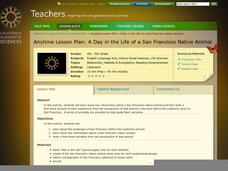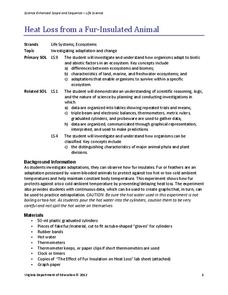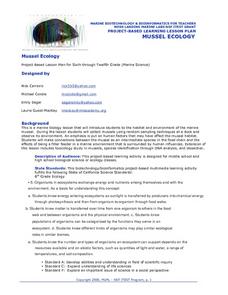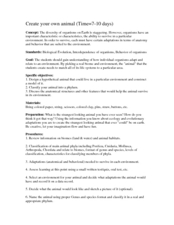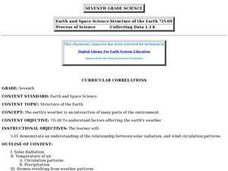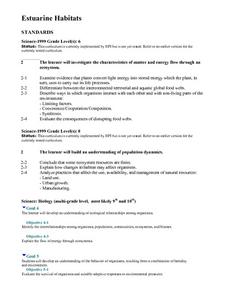Forest Foundation
Fire - How Does it Relate to You?
Forest fires can be a necessary step in keeping a forest healthy, but what happens when they get out of control? Learners investigate the causes and effects of forest fires in two specific areas, culminating in a report about the ways...
Curated OER
Aquatic Ecosystems
Ninth graders record information on aquatic ecosystems and create a labeled diagram of an ecosystem of their choice. They can choose from an ocean zone, estuary, river, lakes, or beaches. The student has to explain their biome of choice.
Curated OER
The Many, Varied, and Unusual Places and Things on Earth
Students discover how energy flows through communities because of the relationship between producers, consumers and decomposers. Examining various ecosystems, they identify the materials that cycle continuously through them. They label...
Curated OER
Pond Life
Environmental explorers create an experiment related to ponds and then present their finding to the class. This resource is extremely open-ended. It needs more concrete objectives and procedures for meeting them.
Port Jefferson School District
Climate Patterns
Young climatologists explore the factors that contribute to a region's climate in this two-part earth science activity. To begin, learners are provided with a map of an imaginary planet and are asked to label global wind and ocean...
Curated OER
Adaptations To the Environment
Students design and construct an imaginary animal that is perfectly adapted to a particular type of biome. They give the animal a scientific name, place it in a phylum and write descriptions about its behavior, reproduction, foraging,...
Kenan Fellows
Sustainability: Learning for a Lifetime – Soil
Do great gardeners really have green thumbs—or just really great soil? Environmental scholars discover what makes Earth's soil and soil quality so important through research and experimentation. Learners also develop an understanding of...
California Academy of Science
A Day inthe Life of a San Francisco Native Animal
Although the lesson is specifically about the San Francisco Bay area, it's good enough to be adapted to any local region. Children research what the landscape in San Francisco was like prior to settlement, they consider the types of...
National Park Service
Reduce Our Carbon Footprint, Let’s Compost!
Roll up your sleeves and get a little dirty with this elementary and middle school compost lesson. All you need is a large plastic container, a couple old newspapers, some organic waste, and a few hundred worms and you're ready to start...
Virginia Department of Education
Heat Loss from a Fur-Insulated Animal
How do animals adapt to weather changes? Provide your class with the ability to understand adaptations and body temperature as they participate in this hands on experiment, using fake fur and hot water. Pupils collect data and analyze...
Curated OER
Mussel Ecology
Students are introduced to the marine environment of the mussel. The emphasis of the lesson is upon what human factors are present to influence the environment in positive and negative ways. They brainstorm in groups in order to conduct...
Curated OER
The Wetlands
Complete a comparison of the wetlands found in New York and Louisiana. Using various research methods, gather data on the wetlands found in New York and Louisiana, the animals, conditions, etc. Data is used to create a brief report on...
Curated OER
A Day in the Life of a San Francisco Native Animal
Students write from an animal's perspective. For this writing lesson students explore the landscape of San Francisco prior to the arrival of the explorers. Students research animals indigenous to the area.
Curated OER
Deadly Deserts
In this reading comprehension worksheet, learners read a passage regarding different deserts and answer 10 questions. The questions are a mix of true/false, short answer, and matching.
Curated OER
Create Your Own Animal
Students design and create their own hypothetical animal. In this biology lesson, students identify the factors organisms need to survive. They classify their animals according to its correct phylum.
Curated OER
Biosphere
Young scholars examine the basic biosphere and its components. In this ecology lesson students complete several experiments including designing a system that is balanced to sustain life.
Curated OER
The Extraordinary Life of the Alaskan Tundra
Students investigate the characteristics of the tundra on the North Slope of Alaska. They conduct Internet research, develop a chart of the types of vegetation, plant growth, and fauna found on the tundra, identify examples in their own...
Curated OER
Science Italian Style: Eruption!
Young scholars explore ways scientists prepare for a volcanic eruption. They observe films of earthquakes, oil spills, volcanoes and hurricanes. Students perform activities to demonstrate the relationship of viscosity to lava flow. ...
Curated OER
What's It All About?- Kansas Prairies
Students examine the interdependence of animal life and the environment. In this Kansas prairies lesson, students read background information on prairies and complete a worksheet to identify the main idea.
Curated OER
Earth's Weather
Seventh graders learn how solar radiation, latitude, and other factors affect weather. They break into six groups and are assigned a topic to research and to present their findings orally.
Curated OER
Estuarine Habitats
Sixth graders study the important habitats, flora, fauna, and physical factors of coastal habitats. They compare the aquatic habitats to terrestrial habitats by researching and completing tables with the information.
Curated OER
Arsenic Contamination: Water Filtration
Students work in groups to design a filtration process that will separate clean water from polluted water. They organize data in tables or graphs and present their findings to the class. Students identify further safety protocols that...
Curated OER
Antarctica Food Chain
Students visit an interactive web page. In this food chain lesson, students visit an interactive web page displaying an example of the food chain in Antarctica. As students move their mouse over the images, captions appear describing the...
Other popular searches
- Six Land Biomes
- 8 Major Land Biomes
- Earths Land Biomes
- 11 Major Land Biomes
- 9 Land Biomes
- 8 Mojor Land Biomes
- Mojor Land Biomes
- Land Biomes Map
- The Earth's Land Biomes
- Earth's Land Biomes
- Six Land Biomes Maps









